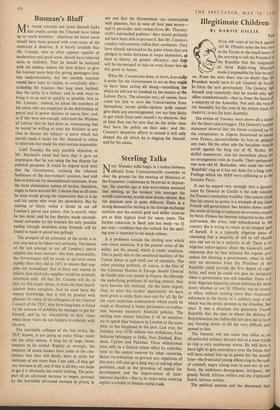Sterling Talks
Norr Monday talks begin in London between officials from Commonwealth countries to clear the ground for the meeting of Ministers at the Economic Conference in Montreal in Septem- ber. Six months ago it was everywhere assumed that sterling, as the weakest link amongst the world's currencies, would need drastic reform. But the position now is quite different There is a strong demand for sterling in the foreign exchange markets and the central gold and dollar reserves are at their highest level for many years. The further reduction in Bank rate last week—to 5+ per cent.—confirms that the outlook for the sterl- ing area is expected to be much calmer.
It is problems outside the sterling area which now claim attention. It is the present value of the dollar, not the pound, which is under suspicion. This is partly due to the continued inability of the United States to pull itself out of recession. The other pressing problem, of course, is the fate of the Common Market in Europe should General de Gaulle take over power in France. So although the underlying problems of sterling remain, they have become less insistent. All the more urgent, then, to seize this further opportunity we have been given to settle them once and for all. By far the most important achievement which could be made at Montreal is better permanent co-ordina- tion between members' financial policies. The sterling area cannot function if all its members try to spend their balances in London at the same time, as has happened in the past. Last year, for instance, over £350 million was withdrawn from balances belonging to India, New Zealand, Rho- desia, Ceylon and Pakistan. These withdrawals were only to a limited extent offset by contribu- tions to the central reserves by other countries. Better co-ordination to prevent any repetition of this story will also go a long way to solving other problems, such as the provision of capital for development and the improvement of inter- national liquidity—that is, to make more working capital available to finance world trade.












































 Previous page
Previous page